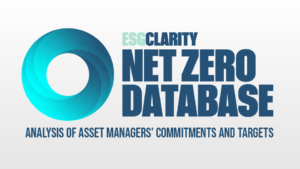The next decade will be completely different, from a sustainability perspective, compared with the past as we adjust economic activities for a world of scarcity, according to Algebris Investments’ Silvia Merler.
In this Green Dream video interview, Natalie Kenway, editor in chief at MA Financial, speaks to Merler, head of ESG and policy research at Algebris Investments, who joins us from the Milan office, about economic activities we take for granted today and how they will be reshaped, the themes within scarcity and qualifying as ‘best in class’.
Watch the full video interview above and read the transcript below.
NK: Tell us a bit about Algebris and the recent launch of the Sustainable World Fund? What is that trying to achieve?
SM: Algebris is a global independent asset management firm. Historically it actually specialised in financials, so investing across the capital structure of banks and insurance and other financial companies. Lately, meaning over the past three years, we have decided to diversify and also create a sustainable investment offering.
So on the one hand, we have integrated ESG factors and sustainability considerations across all the funds that already existed in a very tailored and specific way, but also, we have been working on more in-depth sustainability research with the idea of launching products that are specifically focused on sustainable investment. We launched a green transition private equity fund in 2021, and late last year we launched a sustainable global equity strategy focused on a number of sustainability themes that are actually brought together by the idea of underlying scarcity. For example, the fact that we will be moving to a world in the next 10 years that will be very different from the ones the one that we have experienced so far. And the one key difference we think will be the fact that a lot of the things and economic activities that we take for granted today will have to be reshaped to be made truly sustainable for the long run, and there is the investment opportunity that this fund is trying to target.
NK: Can you tell us more about the themes the fund invests in?
SM: The one thing I really like about this fund is the fact that it is a thematic fund, but it doesn’t just have one theme, which is something you sometimes see. The fund can invest flexibly across eight sustainability linked themes, and all the themes are brought together by an overarching theme, which is the theme of scarcity, as I mentioned earlier. Within that idea, we go and identify sectors in economic activities where we think there will be investment opportunities linked to the transition that our economic model will have to undertake to become sustainable.
In terms of sectors, for example, this includes energy, the entire energy transition towards more renewable energy but also energy efficiency in buildings and so across materials and industrial companies that are connected to that particular need. At the same time, we also think that there will be scarcity in things that are not necessarily natural resources, but are resources of a different kind.
For example, there will be a need to reskill workers and there will be a need to rethink education and system to make them appropriate to produce the right set of skills that we will need for this transition. And so, for example, that is also a sector that we are looking at, as is anything connected to circular economy, recycling, waste management, you name it.
And then across all these themes, there are also some cross-sector megatrends linked to digitalisation or all the industrial components that are instrumental to that transition, such as semiconductor equipment, for example, or anything that has to do with making that transition across those different verticals possible.
NK: On the fund fact sheet you’ve mentioned ‘ESG best in class’. What qualifies for best in class? And maybe you could provide us with some examples?
SM: There’s a number of angles I would take to that question. There is obviously the idea of not wanting to invest in sectors and companies that are active in activities that we believe are detrimental to either society or the environment and so there is a very strict ESG exclusion policy set that goes into defining the investable universe for this fund. And then at the level of the company, we really drill down and look at the sustainability of the company operation and not that much at ESG scores.
We do look at those as well, but to be honest, it is really not the focus of the ESG integration for this fund. Sometimes you have two companies operating in the same exact sectors and they have a very similar ESG score, so from a purely ESG score standpoint, they would look like they’re the same company, they’re identically sustainable in a way.
But when you look at the details and what is really behind so what is the environmental impact of their operations, and whether they are or are not involved in controversies that can be social or environmental in nature and perhaps what is the mix of the revenue, it’s quite often that those two companies would not be the same company, so they would not be equally sustainable.
What we prefer to do, rather than looking at the headline scores, is to really try and build a sustainability profile for all the companies that we look at, to really understand what is behind their business model, whether their business model is really sustainable, both from an environmental and social standpoint.
NK: We always end the Green Dream with this question; what’s your favourite sustainable drink or snack?
SM: My favourite sustainable drink is snack? Tough question! I’m not that much of a snack person but I would probably say fresh fruits.








